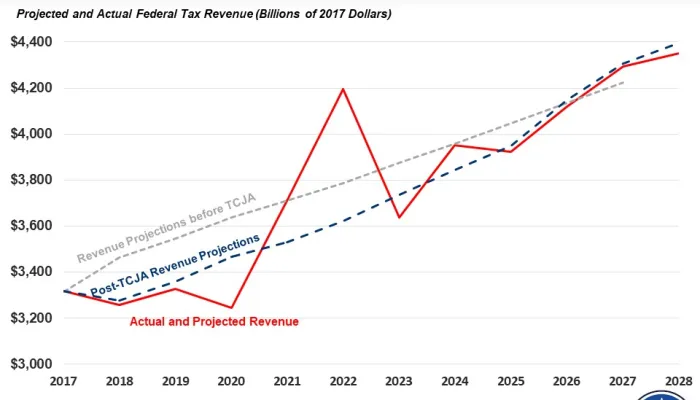Maya MacGuineas: Trump's Tax Plan Will Add $5.5 Trillion to the Debt
Maya MacGuineas is president of the nonpartisan Committee for a Responsible Federal Budget and head of the Campaign to Fix the Debt. She recently wrote an op-ed featured in Time. It is reposted here.
President Trump is on the right track by turning focus toward fixing our nation’s broken tax code. But so far, he is going about it all wrong.
We desperately need tax reform. True reform requires making the tough choices about what works and what doesn’t, not simply offering tax giveaways for all. Tax rate cuts are important and a driver of growth, but do not be hoodwinked: no way will they pay for themselves.
The President understands the challenges we face. Growth is sluggish; our 35% corporate tax rate is the highest in the developed world; our strategy for international taxation is a mess; and the income tax seems to get more complicated and opaque every year.
But these problems cannot be solved by simply lowering all businesses taxes to 15% while cutting taxes for individuals. In fact, the President’s current proposal is likely to worsen our country’s growth prospects by ballooning our record high national debt.
The President’s plan could add over $5 trillion to the national debt over the next decade. As a result, debt would rise to a higher share of the economy than any time in history.
When it comes to tax cuts, there is always the free lunch crowd claiming if we cut taxes, they will pay for themselves through growth. Here in the real world, smart, pro-growth tax cuts can at best cover a fraction of their costs. In fact, large tax cuts can actually harm economic growth by creating a massive debt load.
So if the initial Trump offer is unaffordable, what should we do?
Step one is thoughtful and responsible business tax reform. The average corporate tax rate among wealthy countries is about 10 points below ours, putting them at a competitive advantage. America is the greatest economy in the world, and if we can get our corporate rate to 25 or even 28 percent, we’ll be the most competitive as well. We should finance those rate cuts by ending tax breaks that favor some businesses over others and distort business decision-making. We can also raise revenue by shifting taxation from mobile business entities to the shareholders who actually profit from corporate gains. We can cut the rate further with more aggressive payfors.
Step two is to clean up and simplify the individual tax code. Most of the nation’s $1.6 trillion of annual tax breaks go to individuals – largely to wealthier Americans and mostly in ways that add complexity and hurt economic efficiency. The more tax breaks we can repeal or reform, the better. Most of the revenue can go to cutting individual rates; some should go for deficit reduction. One idea worth trillions is a cap I developed with Marty Feldstein and Dan Feenberg to limit the total value of major tax preferences as a share of income. The Administration could keep all the tax breaks it wants to protect (like the mortgage deduction) but include it in this limit.
Step three is to reform our entitlement programs. Social Security, health, and interest spending are responsible for 82 percent of projected spending growth over the next decade; and both Social Security and Medicare are headed toward insolvency. Thoughtful reforms can improve health outcomes, encourage work, strengthen retirement security, and reduce the long-term debt all while protecting the most vulnerable.
The final step is to do everything else we can to encourage economic growth. While promises of 4 percent annual growth are pure fantasy, we need to get our growth rates well above 2 percent. That faster economic growth needs to be broadly shared so it lifts all incomes, improves everyone’s wealth, and helps our fiscal situation. To achieve faster growth, policymakers need to fire on all cylinders -- pursuing reforms to taxes and entitlements but also regulations, immigration, federal investment, trade, and energy. A critical component of the growth agenda is to get our debt under control.
As a nation, we cannot pretend we can grow our way out of any hard choices.
But the President is right to focus on economic growth. If we don’t get our economy growing again, the American dream may be history.
"My Views" are works published by members of the Committee for a Responsible Federal Budget, but they do not necessarily reflect the views of all members of the Committee.


